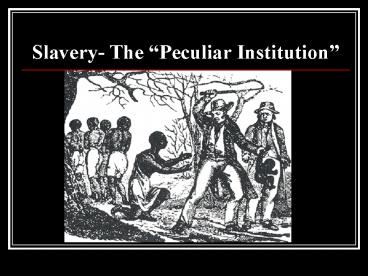Slavery- The - PowerPoint PPT Presentation
1 / 25
Title: Slavery- The
1
Slavery- The Peculiar Institution
2
THE MIDDLE PASSAGE Name given to the voyage
Africans endured from their homeland to the New
Worldthe names of those who were subjected to
the treacheries of this voyage were lost for
all-time
3
(No Transcript)
4
African kings and merchants would often trade
slaves for various items such as textiles, beads,
brandy, horses and especially guns
5
Captive Africans waiting to be sold to Europeans
as slaves
6
(No Transcript)
7
Conditions Aboard a Slave Ship
- Conditions were meant to strip slaves of their
humanity - Captains were either loose packers or tight
packers - Conditions below deck extreme overcrowding,
lice, malnutrition, inadequate ventilation,
little or no practice of sanitation - Before arrival, slaves bodies would oiled to
hide scars
8
(No Transcript)
9
This is a rare picture of the lower deck of a
slave ship, the Albanez. It was captured by a
British anti-slavery vessel and the captives were
set free.
10
(No Transcript)
11
Slaves were often made to dance to prevent
outbreaks of gangrene
12
(No Transcript)
13
(No Transcript)
14
Slavery in the South
- Cotton Kingdom/need for slavery united southern
states - 1830s- fear in south grows due to voices of
northern abolitionists - South becomes more defensive as time passes
- John C. Calhoun- major supporter of slavery
- Masters used Bible, Greeks/Roman as justification
15
Southern Cotton Production- 1820
16
Southern Cotton Production- 1860
17
Slave Populations- 1820
18
Slave Populations- 1860
19
We Southerners see it now in its true light, and
regard it as the most safe and stable basis for
free institutions in the world.-John C. Calhoun
20
3 Types of Slavery
- Large Plantation Slavery- usually over 100
slaves, master, overseers - Small Farmer Slavery- owner worked with slaves,
usually 10 or fewer slaves - Which was worse??? Depended on the master
- Urban Slavery- house servants or artisans who had
much more freedom to roam
21
Duties/Punishments
- Slaves planted, tended, harvested crops
- Cared for children
- Built fences, fed animals, etc.
- Runaways punished usually by whipping
- Children often purposely viewed whippings
22
Now suppose they was free, you see theyd all
think themselves as good as we
- As attacks of abolitionists grew, south passed
more laws making it harder to free slaves - Money in south, instead of going towards
industry/commerce, went to maintaining slavery - Whites in south enjoyed feeling superior to blacks
23
Slave Culture
- Slaves considered property regardless of
treatment - Combined Christianity with African traditions
- Unique culture would come to enrich American
culture for years to come - Slave spirituals maintained humanity
24
South vs. North
- Northern vessels carried Southern products
- Cotton ginned in Northern gins, navigated by
northern steamboats - South remained agricultural, ignored
commerce/industry - Tariff protected Northern manufactures
Southern plantation
25
What is the legacy of American slavery???































